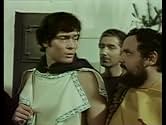In Greece at the time of antiquity. In the year 600 before Christ, the 45th Olympic Games are held, which are all in the sign of the old city-renown Sparta-Athens.In Greece at the time of antiquity. In the year 600 before Christ, the 45th Olympic Games are held, which are all in the sign of the old city-renown Sparta-Athens.In Greece at the time of antiquity. In the year 600 before Christ, the 45th Olympic Games are held, which are all in the sign of the old city-renown Sparta-Athens.
Photos
- Director
- Writers
- All cast & crew
- Production, box office & more at IMDbPro
Storyline
Featured review
In 1972 the Olympic Games were about to be held in Germany, or rather: West Germany. One aspect the West Germans dreaded most about the forthcoming games was the clear superiority of East Germany in so many sports.
This propagandist satire is a direct reflection of these feelings. The story is set in ancient Greece, with Sparta and Athens as representatives for East and West Germany, respectively. As it is a satire, it is also a comedy, but some of the representation of Spartan (i.e. East German) training and especially youth selection methods go beyond sarcastic mockery and show thinly concealed bitterness and disdain. For example, while East German children (in real life) were screened at a young age to determine in which sport they might excel, Spartan babies (in this film) who didn't measure up to specification were simply abandoned. For balance, West German decadence is also a target for mockery: the top Athenian athlete exercises because his reward is the pampering he receives at the local brothel.
Yes, brothel! Sex is another theme in this film - while the title of the film is a slogan that originated in the 19th century early fitness movement, it leaves ample room for alternative interpretations (it could be translated as "Let us praise what makes us hard!"). On the evidence of the content, one could argue that sex and nudity are merely used as bait to lure an audience into a propaganda film, but this is not entirely fair. Rolf Thiele made quite a few sex comedies in historical settings in those years, and it is rather the political slant of this movie that is a bit of a novelty.
This propagandist satire is a direct reflection of these feelings. The story is set in ancient Greece, with Sparta and Athens as representatives for East and West Germany, respectively. As it is a satire, it is also a comedy, but some of the representation of Spartan (i.e. East German) training and especially youth selection methods go beyond sarcastic mockery and show thinly concealed bitterness and disdain. For example, while East German children (in real life) were screened at a young age to determine in which sport they might excel, Spartan babies (in this film) who didn't measure up to specification were simply abandoned. For balance, West German decadence is also a target for mockery: the top Athenian athlete exercises because his reward is the pampering he receives at the local brothel.
Yes, brothel! Sex is another theme in this film - while the title of the film is a slogan that originated in the 19th century early fitness movement, it leaves ample room for alternative interpretations (it could be translated as "Let us praise what makes us hard!"). On the evidence of the content, one could argue that sex and nudity are merely used as bait to lure an audience into a propaganda film, but this is not entirely fair. Rolf Thiele made quite a few sex comedies in historical settings in those years, and it is rather the political slant of this movie that is a bit of a novelty.
- How long is Praise, What Makes You Hard?Powered by Alexa
Details
- Release date
- Country of origin
- Language
- Also known as
- Praise, What Makes You Hard
- Filming locations
- Production companies
- See more company credits at IMDbPro
- Runtime1 hour 22 minutes
- Sound mix
- Aspect ratio
- 1.66 : 1
Contribute to this page
Suggest an edit or add missing content

Top Gap
By what name was Gelobt sei, was hart macht (1972) officially released in Canada in English?
Answer














